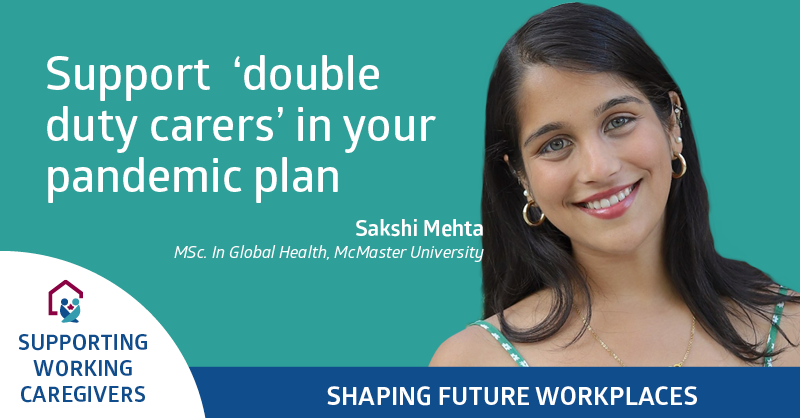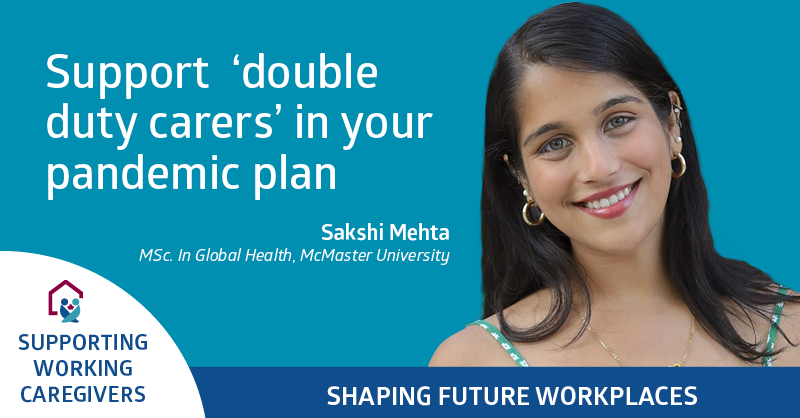A case for employee caregiver support as part of your pandemic plan
The lessons from healthcare’s ‘double duty carers’ warrant consideration as organizations update their pandemic plans post COVID-19.
In the healthcare sector, many workers are ‘double duty carers’ (DDCs) – individuals who provide care both at work and at home. In their paid work, DDCs often work as front-line essential health care service providers in home care, or facility-based care. DDCs are an important workforce that are vulnerable to negative physical and mental health consequences which are exacerbated during the COVID-19 pandemic.
This study investigated DDCs’ caring experience, supports that are being utilized, and current gaps in supporting this vulnerable carer population during the pandemic. To do this, 16 semi-structured interviews were conducted with DDCs in Ontario and analyzed thematically to identify five overarching themes surrounding their caring experience and supports during the pandemic. Among the interviewed DDCs, 6.25% worked in outpatient facilities, 25% worked in hospitals, 31.25% in long-term care or nursing homes, and 37.50% in home care.
In their paid caring role, DDCs had increased responsibilities, hours, and expectations primarily due to staff shortages which led to physical exhaustion and emotional strain, leading to an overall poor workplace wellness. For many DDCs, supervisors had disappeared from the frontlines of care, making support difficult to access. For some, this involved having to re-use their masks for up to a week, which instilled concerns for personal safety and distrust with their employers.
In their unpaid caring role, many DDCs could no longer access formal home care services that supported them in their care for their dependent. Flexibility and availability of medical appointments and community programs, such as adult and child day care services, were either shut down or changed hours of operation and/or access protocols without notice; this caused DDCs to frequently experience unpaid care emergencies. The social isolation of care recipients placed additional pressure on DDCs for care and socialization.
While some reduced their paid work hours to cope, other DDCs relied on prioritization strategies, as well as collaborating with work colleagues to manage the increased work responsibilities. As DDCs experienced more unpaid care emergencies and had trouble getting time off, several chose to reach out to senior managers or unions for the support (i.e., flexibility, understanding) they needed to be able to care for their dependent.
Outside of just work, all DDCs reported implementing much stricter safety precautions, such as physical distancing in their own homes, and spending time away from home during the worst times of the pandemic. Simple strategies, such as prepping meals ahead of time for family and adopting meditation, were cited as ways to manage their own stress.
This research provides insight into DDCs’ care struggles during the pandemic and points to the need for improving awareness of and time for: supports (i.e., flexibility, understanding), mental health strategies, and time management skills. This research also identifies the importance of employer support for DDCs on an ongoing basis, and proactively, as part of pandemic planning.
Read the Research Brief
ABOUT THE PROJECT
Carers Canada is leading the knowledge mobilization activities for a multi-sectorial research program to spread and scale a carer-friendly workplace standard, known as the ‘Carer-Inclusive and Accommodating Organizations’ Standard (CSAB701-17). Led by Dr. Allison Williams, CIHR Research Chair in Gender, Work and Health at McMaster University, the research program consists of six inter-related sub-projects that will: increase awareness of the standard across Canada; evaluate readiness to change; determine feasibility and cost benefit; embrace cultural competency; consider Indigenous perspectives; and create an international standard. Learn more

CIHR/SSHRC Healthy Productive Work Partnership Grant “Scaling up the Career Inclusive Accommodating Organizations Standard” FRN: HWP-146001 (CIHR); 890-2016-3018 (SSHRC).
 Sakshi MehtaJanuary 24, 2022
Sakshi MehtaJanuary 24, 2022

A case for employee caregiver support as part of your pandemic plan.
The lessons from healthcare’s ‘double duty carers’ warrant consideration as organizations update their pandemic plans post COVID-19.
In the healthcare sector, many workers are ‘double duty carers’ (DDCs) – individuals who provide care both at work and at home. In their paid work, DDCs often work as front-line essential health care service providers in home care, or facility-based care. DDCs are an important workforce that are vulnerable to negative physical and mental health consequences which are exacerbated during the COVID-19 pandemic.
This study investigated DDCs’ caring experience, supports that are being utilized, and current gaps in supporting this vulnerable carer population during the pandemic. To do this, 16 semi-structured interviews were conducted with DDCs in Ontario and analyzed thematically to identify five overarching themes surrounding their caring experience and supports during the pandemic. Among the interviewed DDCs, 6.25% worked in outpatient facilities, 25% worked in hospitals, 31.25% in long-term care or nursing homes, and 37.50% in home care.
In their paid caring role, DDCs had increased responsibilities, hours, and expectations primarily due to staff shortages which led to physical exhaustion and emotional strain, leading to an overall poor workplace wellness. For many DDCs, supervisors had disappeared from the frontlines of care, making support difficult to access. For some, this involved having to re-use their masks for up to a week, which instilled concerns for personal safety and distrust with their employers.
In their unpaid caring role, many DDCs could no longer access formal home care services that supported them in their care for their dependent. Flexibility and availability of medical appointments and community programs, such as adult and child day care services, were either shut down or changed hours of operation and/or access protocols without notice; this caused DDCs to frequently experience unpaid care emergencies. The social isolation of care recipients placed additional pressure on DDCs for care and socialization.
While some reduced their paid work hours to cope, other DDCs relied on prioritization strategies, as well as collaborating with work colleagues to manage the increased work responsibilities. As DDCs experienced more unpaid care emergencies and had trouble getting time off, several chose to reach out to senior managers or unions for the support (i.e., flexibility, understanding) they needed to be able to care for their dependent.
Outside of just work, all DDCs reported implementing much stricter safety precautions, such as physical distancing in their own homes, and spending time away from home during the worst times of the pandemic. Simple strategies, such as prepping meals ahead of time for family and adopting meditation, were cited as ways to manage their own stress.
This research provides insight into DDCs’ care struggles during the pandemic and points to the need for improving awareness of and time for: supports (i.e., flexibility, understanding), mental health strategies, and time management skills. This research also identifies the importance of employer support for DDCs on an ongoing basis, and proactively, as part of pandemic planning.
Read the Research Brief
Sakshi Mehta recently completed her education at McMaster University, graduating with an Honours Bachelor of Health Sciences and Master of Science in Global Health. She is currently continuing her studies to pursue Public Service and work towards a career in health policy or public health. For the past two years, she has worked for the Council of Agencies Serving South Asians, a non-profit aimed at promoting equity and empowerment for marginalized communities. Through various research, community, and work experiences, Sakshi has developed a passion for working at the intersections of equity, education, and health policy.
FAVORITE PASTIME: In her spare time, Sakshi can be found cooking, discovering new coffee shops, working out or catching up on her favourite shows.
Instagram: @sakshiisk
Facebook: @sakshi0403
LinkedIn: @Sakshi Mehta
Twitter: @sakshiisk
ABOUT THE PROJECT
Carers Canada is leading the knowledge mobilization activities for a multi-sectorial research program to spread and scale a carer-friendly workplace standard, known as the ‘Carer-Inclusive and Accommodating Organizations’ Standard (CSAB701-17). Led by Dr. Allison Williams, CIHR Research Chair in Gender, Work and Health at McMaster University, the research program consists of six inter-related sub-projects that will: increase awareness of the standard across Canada; evaluate readiness to change; determine feasibility and cost benefit; embrace cultural competency; consider Indigenous perspectives; and create an international standard. Learn more

CIHR/SSHRC Healthy Productive Work Partnership Grant “Scaling up the Career Inclusive Accommodating Organizations Standard” FRN: HWP-146001 (CIHR); 890-2016-3018 (SSHRC).
